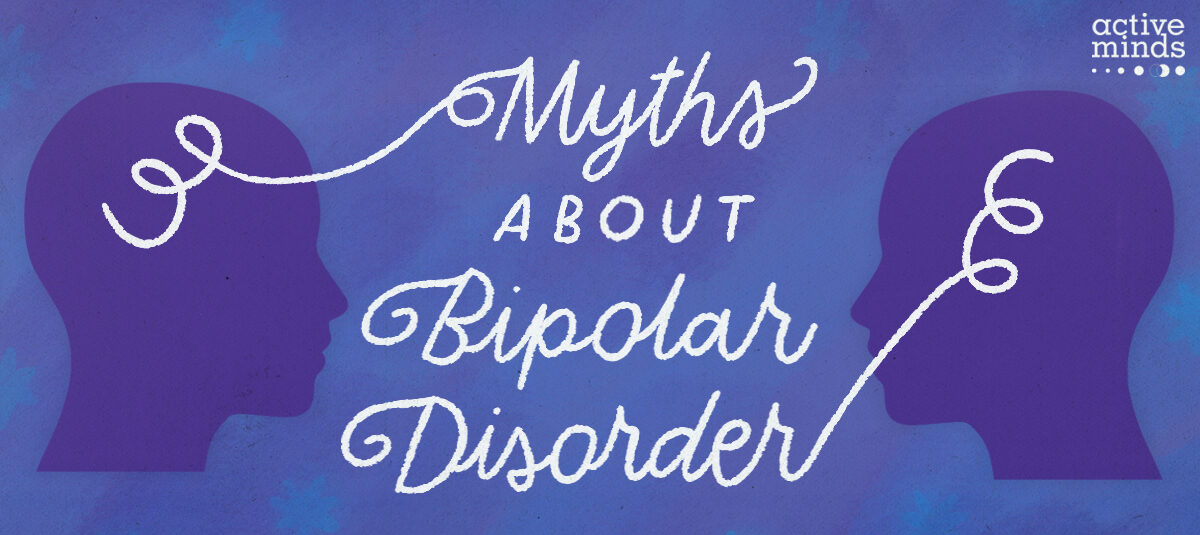Have you ever heard someone say, “The weather has been so bipolar”? Or make an off-hand comment of “He’s been acting so bipolar,” when someone’s mood has been more erratic than usual? These phrases, while seemingly harmless, actually have a deeper impact than we might realize. When we use mental illnesses like bipolar disorder as adjectives for negative experiences in our lives, we further legitimize myths about bipolar disorder that are incredibly harmful to those who live with the disorder, and our wider society as well.
It’s normal to wonder how using a seemingly innocent phrase like the ones listed above can have such a big impact. When we use mental illnesses like bipolar disorder in a negative and minimizing way, we continue to perpetuate stigma or misunderstanding about the condition. This stigma does not only affect how individuals who don’t have bipolar disorder feel about it, but also creates “self-stigma” where individuals who have this diagnosis feel negative towards themselves. They may feel embarrassed, ashamed, or even scared. The best way to combat this stigma is to continue to educate yourself about the disorder and speak up when you hear something being shared that isn’t true. To help you get started, here are a few common myths about bipolar disorder:
Myth: Someone who has bipolar disorder is just “moody” and dramatic.
Fact: While growing up, I would sometimes hear someone be described as “bipolar” when they were just experiencing a reaction to something that happened. I might have heard someone say “Ugh, they’re so bipolar. A minute ago we were fine, and now they’re mad at me.” The truth is, we all have days where we are happy one minute, then stressed, tired, sad, or grumpy later. Humans react to changes in their environment and to the behaviors of other people, and experiencing different emotions throughout the day is normal. The difference for individuals with bipolar disorder is oftentimes these mood shifts are more intense, longer lasting, and create major changes in their behaviors. Mood shifts related to bipolar disorder can last for weeks. For example, one form of bipolar disorder involves episodes of mania (an elevated mood) lasting at least one week, and a depressive episode lasting for at least two weeks.
Myth: Bipolar disorder is the same for everyone.
Fact: Sometimes people think that mental illnesses look and feel the same for everyone with a shared diagnosis, but this is not true! Bipolar disorder has two different types: bipolar disorder I and bipolar disorder II. Bipolar disorder I involves episodes of mania, whereas bipolar disorder II involves episodes of hypomania. The difference between these two is that an episode of hypomania is shorter and often less intense than true mania. Both of these forms still have episodes of depression. There is even cyclothymia, which involves less extreme mood shifts that can happen more rapidly. Additionally, even within these subtypes of bipolar disorder, people may have different experiences and require different treatments. It’s important to remember that everyone, no matter what diagnosis they carry, will have their own experiences and perspective. With that in mind, it’s important to create space for all these different stories by validating and accepting the stories of those around you.
Myth: Mania is fun, exciting, and can help people be creative.
Fact: While we may have heard stories of artists or musicians discussing how mania has helped their creative process, this is not usually the case for individuals living with bipolar disorder. More often than not, manic episodes can cause daily struggles and lead to consequences that linger even after the feelings of mania have gone away. Mania can sometimes lead people to feel euphoric and have higher levels of energy, but other times it can make those experiencing it feel irritable and out of control. This can lead to impulsive behaviors that one normally wouldn’t do that then create lasting impacts. Coming out of an episode of mania or hypomania can also lead to a “crash,” or feelings of exhaustion and depression. Just like how everyone experiences bipolar disorder differently, everyone will have different experiences with its symptoms.
Bipolar disorder affects a lot of people in the world (the World Health Organization estimates 40 million people worldwide!) — the odds are someone in your life is living with bipolar disorder, whether you know it or not. It’s important to be informed about bipolar disorder so that we can better understand, recognize, and support individuals experiencing it. Many individuals who end up being diagnosed will be nervous or even fearful to share this information with people in their lives because others might assume that they will be difficult to get along with, unreliable, or “moody.” It could even keep them from seeking care or treatment. On the other hand, having support and empathy from loved ones can help individuals manage and cope with their diagnosis and symptoms. By spreading awareness and debunking myths, we can continue creating space and opportunities for more individuals living with bipolar disorder to feel seen, heard, and understood.




